China on Monday launched the third and final module to complete its permanent space station and realize a more than decade-long effort to maintain a constant crewed presence in orbit, as its competition with the U.S. grows increasingly fierce.
Mengtian was blasted into space on Monday afternoon from the Wenchang Satellite Launch Center on the southern island province of Hainan.
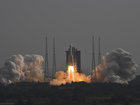 Full Story
Full Story
Japan's space agency said a rocket carrying eight satellites failed just after liftoff Wednesday and had to be aborted by a self-destruction command, in the country's first failed rocket launch in nearly 20 years.
The Epsilon-6 rocket was not in the right position to orbit around the Earth and its flight had to be aborted less than seven minutes after takeoff from the Uchinoura Space Center in the southern Japanese prefecture of Kagoshima, Japan Aerospace Exploration Agency President Hiroshi Yamakawa told an online news conference.
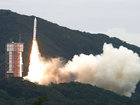 Full Story
Full Story
Ancient Mars may have had an environment capable of harboring an underground world teeming with microscopic organisms, French scientists reported Monday.
But if they existed, these simple life forms would have altered the atmosphere so profoundly that they triggered a Martian Ice Age and snuffed themselves out, the researchers concluded.
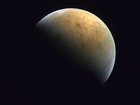 Full Story
Full Story
Swedish scientist Svante Paabo won the Nobel Prize in medicine Monday for his discoveries on human evolution that provided key insights into our immune system and what makes us unique compared with our extinct cousins, the award's panel said.
Paabo has spearheaded the development of new techniques that allowed researchers to compare the genome of modern humans and that of other hominins — the Neanderthals and Denisovans.
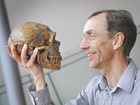 Full Story
Full Story
NASA will on Monday attempt a feat humanity has never before accomplished: deliberately smacking a spacecraft into an asteroid to slightly deflect its orbit, in a key test of our ability to stop cosmic objects from devastating life on Earth.
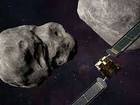 Full Story
Full Story
Saudi Arabia said Thursday it will launch a training program with the goal of sending its own astronauts, including a woman, into space next year.
The kingdom is actively promoting science and technology as part of its wide-ranging Vision 2030 plan to overhaul its economy and reduce its dependency on oil.
 Full Story
Full Story
The United Arab Emirates will launch its first lunar rover in November, the mission manager said Monday.
Hamad Al Marzooqi told The National, a state-linked newspaper, that the "Rashid" rover, named for Dubai's ruling family, would be launched from the Kennedy Space Center in Florida sometime between Nov. 9 and Nov. 15. The exact date will be announced next month, he said.
 Full Story
Full Story
NASA will try again Saturday to launch its new moon rocket on a test flight, after engine trouble halted the first countdown this week.
Managers said Tuesday they are changing fueling procedures to deal with the issue. A bad sensor also could be to blame for Monday's scrapped launch, they noted.
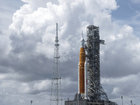 Full Story
Full Story
Years late and billions over budget, NASA's new moon rocket makes its debut next week in a high-stakes test flight before astronauts get on top.
The 322-foot (98-meter) rocket will attempt to send an empty crew capsule into a far-flung lunar orbit, 50 years after NASA's famed Apollo moonshots.
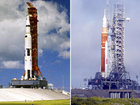 Full Story
Full Story
Stargazers gathered to watch the Perseid meteor shower among ancient statues atop Mount Nemrut in southeastern Turkey.
Hundreds spent the night at the UNESCO World Heritage Site for the annual meteor show that stretches along the orbit of the comet Swift–Tuttle.
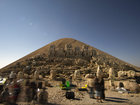 Full Story
Full Story



